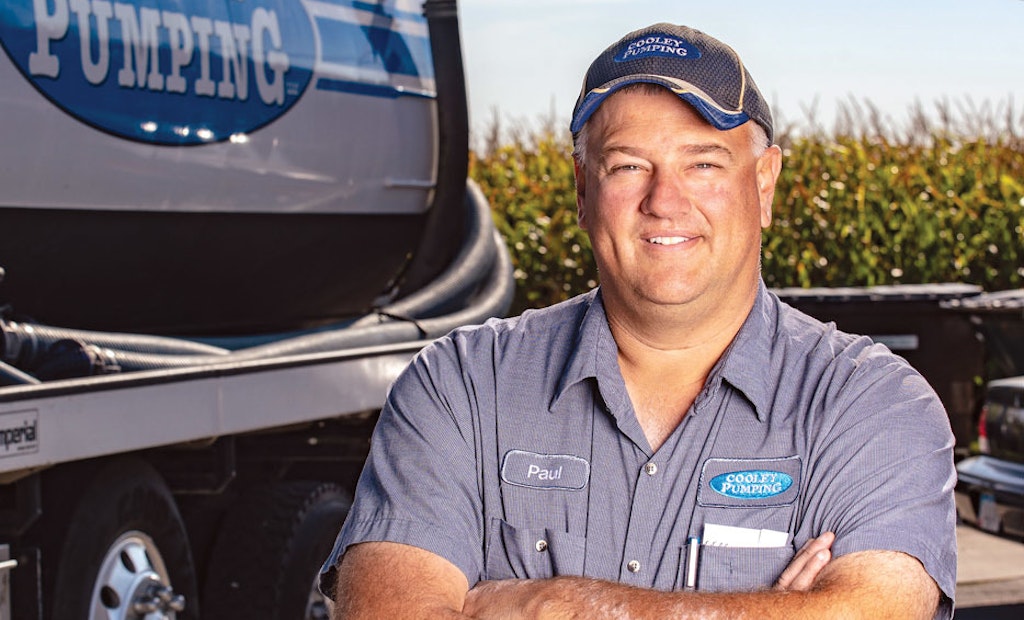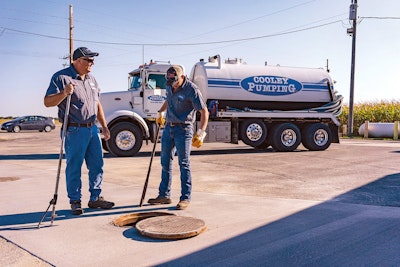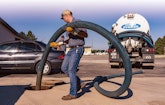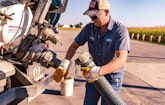
Paul Cooley juggles the work of 10 different businesses from his headquarters at Grundy Center, Iowa. (Photos by K.C. McGinnis)
Paul Cooley is an enterprising man with 10 successful ventures running simultaneously. Ten! Most of them emanate from Cooley Pumping, a four-generation, 66-year-old family firm he owns. To describe Paul Cooley as very busy understates the situation. Could he, in fact, have too much on his plate?
“Some days I feel that way,” he says. “We’re busy but we just keep on going.”
The going began 24 years ago when Cooley took over the pumping company started by his grandfather, Francis Hopkins, in Grundy Center, a rural north-central Iowa community of 2,600. While his grandfather’s Ford truck carried an 800-gallon tank, Cooley’s newest truck from Imperial Industries is a 2018 Peterbilt 567 with a 4,000-gallon stainless tank and a National Vacuum Equipment 4310 pump. The second rig is a 2014 Peterbilt 365 from Imperial Industries also with a 4,000-gallon aluminum tank, a National Vacuum Equipment 4310 pump and hoist. Neither truck sits idle through the week.
The trucks are bigger, and so is his service territory. “I look at the service area on the map we have here in the office,” Cooley says, laughing. “We are way beyond the 30-mile circle on the map.” The company trucks now drive up to 60-70 miles from their home base, and the service-circle continues to widen.
“It has gotten bigger and bigger all the time. It can go a little farther yet,” he explains. “Des Moines is out. Ames is out. But we are starting to push toward Cedar Falls. I just keep getting calls and hate to say no.”
The pumping company’s rolling stock isn’t all that’s grown. While the headquarters still is in Grundy Center, the company shop is 7 miles away in Morrison, a town of about 100 people. A 70-by-120-foot building constructed there more than a decade ago now shares 4 acres with 30-by-54-foot and 54-by-54-foot-square buildings erected to house equipment and materials. Yet another company site is in Reinbeck, 5 miles on the other side of Morrison, with an 85-by-120-foot warehouse.
The septic business constitutes 70 percent of Cooley’s overall enterprise, with residential systems claiming 70 percent of the work. His company also installs 80-100 septic systems most years — though somewhat fewer systems were installed last year because of persistent rains. The installations constitute a quarter or more of his septic business
Most onsite work is building replacement systems after aging ones fail to pass time-of-sale inspections. Only 20 percent of systems installed by Cooley are for new residences. Three-bedroom homes require 1,250-gallon tanks and four-bedrooms, 1,500-gallon units. Each will need pumping every three or four years, ensuring more future business.
SERVICE EXPANSION
Real-estate transfer inspections is one emerging specialty, a job Cooley undertakes himself. When a property is sold, the Iowa Department of Natural Resources requires a septic system’s distribution box be uncovered. Lines are inspected for cracks to see if effluent is flowing out as intended and groundwater is not infiltrating. Cooley also certifies the system hasn’t been altered to allow effluent to run directly into a ditch or creek.
“It doesn’t matter if it’s a new property that hasn’t been inspected in two years or has been in the family for a hundred years,” Cooley says. He typically completes 250 certification inspections annually.
Paul’s Potties has also grown out of the septic business. That enterprise has an inventory of more than 1,000 restrooms from PolyJohn. The company has four restroom service trucks, Ford F-550 models from 2018 and 2019, each built by Imperial Industries and carrying 775-gallon waste and 400-gallon freshwater aluminum tanks. There are also two Imperial Industries 300-gallon waste and 150-gallon freshwater aluminum slide-in units used on skids.
Cooley says his initial goal was an inventory of 500 restrooms, but the workload dictated more.
“Wherever the number goes is OK. We’re not scared.” Cooley exhibits one mark of an entrepreneur: a willingness to take risks. A reward of risk-taking is that people notice.
For example, Pioneer Seed Co. noticed Paul’s Potties and approached Cooley Sanitation more than a dozen years ago with a proposal to service the 800 portable restrooms the company employs during its June to August hybrid corn detasseling season. It was cheaper and easier for Pioneer to outsource the cleaning. Soon other hybrid seed companies came calling.
Perhaps the fastest-growing service Cooley Sanitation offers is cleaning drains and lines. The company has three RIDGID SeeSnake cameras, a Spartan Tool 18 gpm, 4,000 psi trailer jetter, and several Spartan Tool cable machines; and it uses two Ford Transit service vans for this side of the business.
Cooley says a surge in drain cleaning business over the past two years is partly because of an informal relationship with a Waterloo plumber. “They send a lot of work our way.” As he increasingly encroaches on urban markets in the area, he anticipates additional growth in line-clearing work.
TRASH TALK AND EVENT CENTER
Most pumpers handle anything wastewater related, but Cooley moved into solid waste collection. Two late-model garbage trucks make curbside collections in seven local communities. Commercial customers generating waste on a larger scale contract for one of Cooley Sanitation’s 500 trash containers. Construction crews or residential customers with greater demands can get Poynette Ironworks 20- or 30-yard roll-off containers from Cooley’s inventory of 80 bins. He has two roll-off trucks (Peterbilt) with Galbreath hoists.
Cooley also runs a recycling center in Reinbeck with designated receptacles for cardboard, paper, glass, plastic, tin cans and scrap metal. Even worn-out appliances are accepted. If a Reinbeck recycler can’t make it to the center, Cooley trucks will pick up the recyclables curbside once a week. It’s a customer service, but not profitable at the moment. The industry is experiencing one of its major market fluctuations. “Recycling sort of went in the tank after China quit buying,” Cooley says.
In a departure from sanitation work, Cooley 13 years ago teamed with a restaurateur friend, Tom McLean, to start the mobile food-prep business. Like the rest of his undertakings, PT Grillers has enjoyed success, so much so that the two partnered last year in a new venture — an event center in a landmark building on a highway on the outskirts of Reinbeck. A former restaurant, the building was modernized and renovated and is a venue for public performances, reunions, birthday parties and weddings. “We’ve had six couples married in the building already,” Cooley says.
Most recently, Cooley partnered with a friend in the construction industry to build a public storage complex in Morrison. The units are used for campers, cars, boats and the like.
CROSS-TRAINING
The 45-year-old Cooley accomplishes all of this enterprising work with 20 employees. While there may be specialists among them, most are cross-trained. Employees are more valuable when they are knowledgeable about all of the machinery in the yard: They can be on call for weekend calls.
So, that’s a complete summary of what Cooley is up to these days. Unless you want to talk about the 160-acre farm he operates. It is a corn and bean row-crop operation without livestock, which makes growing and harvesting seasons especially busy times. “Winter is slower around here,” Cooley says. “Nothing is growing in the fields. The ground is frozen so there aren’t many septic installations. Pumping slows down some because if you aren’t having trouble of some kind, you aren’t going to call for a pump.”
Of course, in winter months people still need to eat, get married, clean out their drains, and have their waste hauled away and garbage picked up, so things are still relatively busy. In which of these fields of endeavor is Cooley most comfortable? If he could only run one business, which would it be?
“The septic service,” he says without hesitation. Part of its appeal is that it is a family thing. “My grandfather started it, and it is near and dear to my heart. My wife (Deborah) is involved in it. My son, Josh, who’s working on a business degree in college, helps in the summer. My oldest daughter, Rachel, in high school, does a lot of mowing of property and washes the portable toilets. And my youngest daughter, Megan, is in eighth grade and she is willing to help … if she has to.”
Wastewater wisdom
Harvard Business Review writes books about managing companies. The writers come up with such pithy counsel as “get three things done before noon” and “fire yourself.” Paul Cooley’s homegrown management philosophy is pretty much on par with the business deans.
Asked what he would tell like-minded business people who want to work for themselves, the first piece of counsel from the busy owner of Cooley Pumping / Cooley Sanitation is perhaps the most predictable. “You have to prepare to put in the hours. If you want a 9-to-5 job, that ain’t going to happen.”
Other gems: “You have to calculate your risks,” and “You should only hire people who are smarter than you.”
Over the last almost-quarter century, Cooley has successfully melded learned management principles with instinctive organizational habits. Consequently, he surrounds himself with competent personnel. “I have excellent staff in the office keeping a good eye on things. I have a good foreman who oversees the septic tank installations and quoting bids and making sure each job is complete.”
Cooley studied business methods and principles for two years at a junior college. So, is he good at delegating responsibility? “I try to be,” he says, hinting that it’s still work in progress. It’s been hard for him to step away from fieldwork. “I try to stay in the office, but I’m a hands-on guy. Being in the office is not what I like to do. Still, I need to be in the office to deal with every entity instead of just doing septic work.”
He freely acknowledges that one of his office assets is his wife, Deborah. “The garbage routing and portable toilet routing require a lot of attention. My wife is good with that. She’s good with logistics.”








